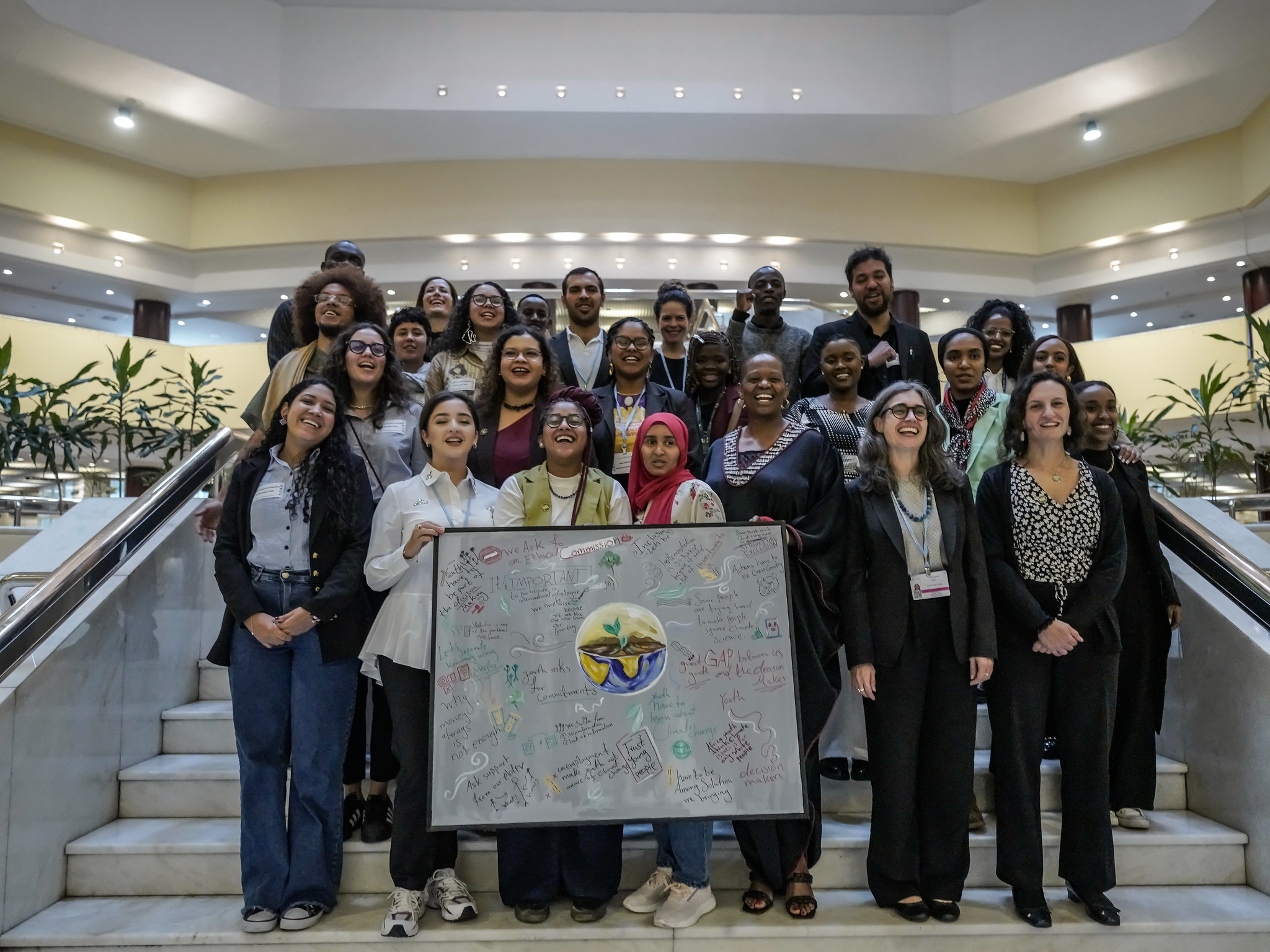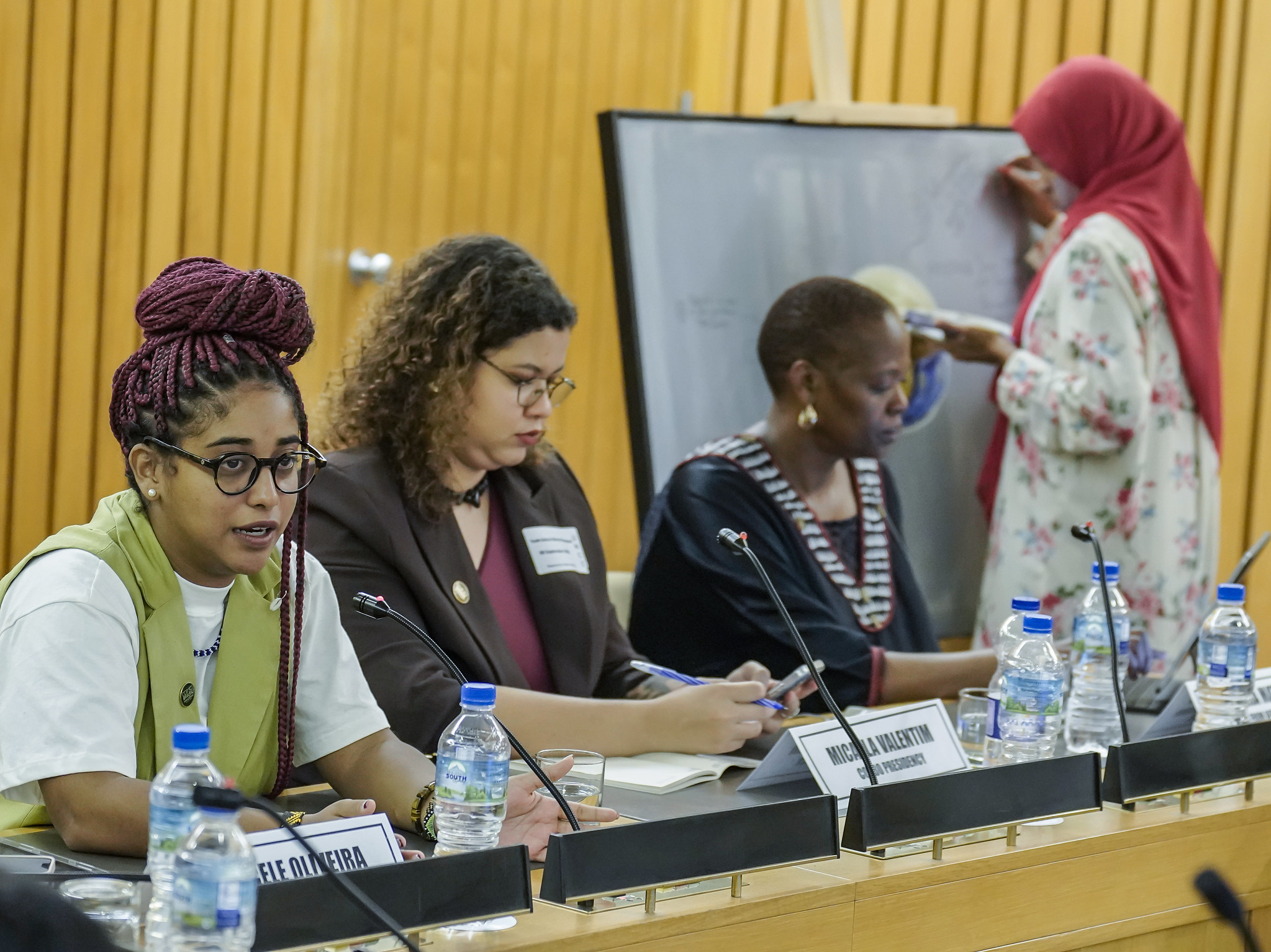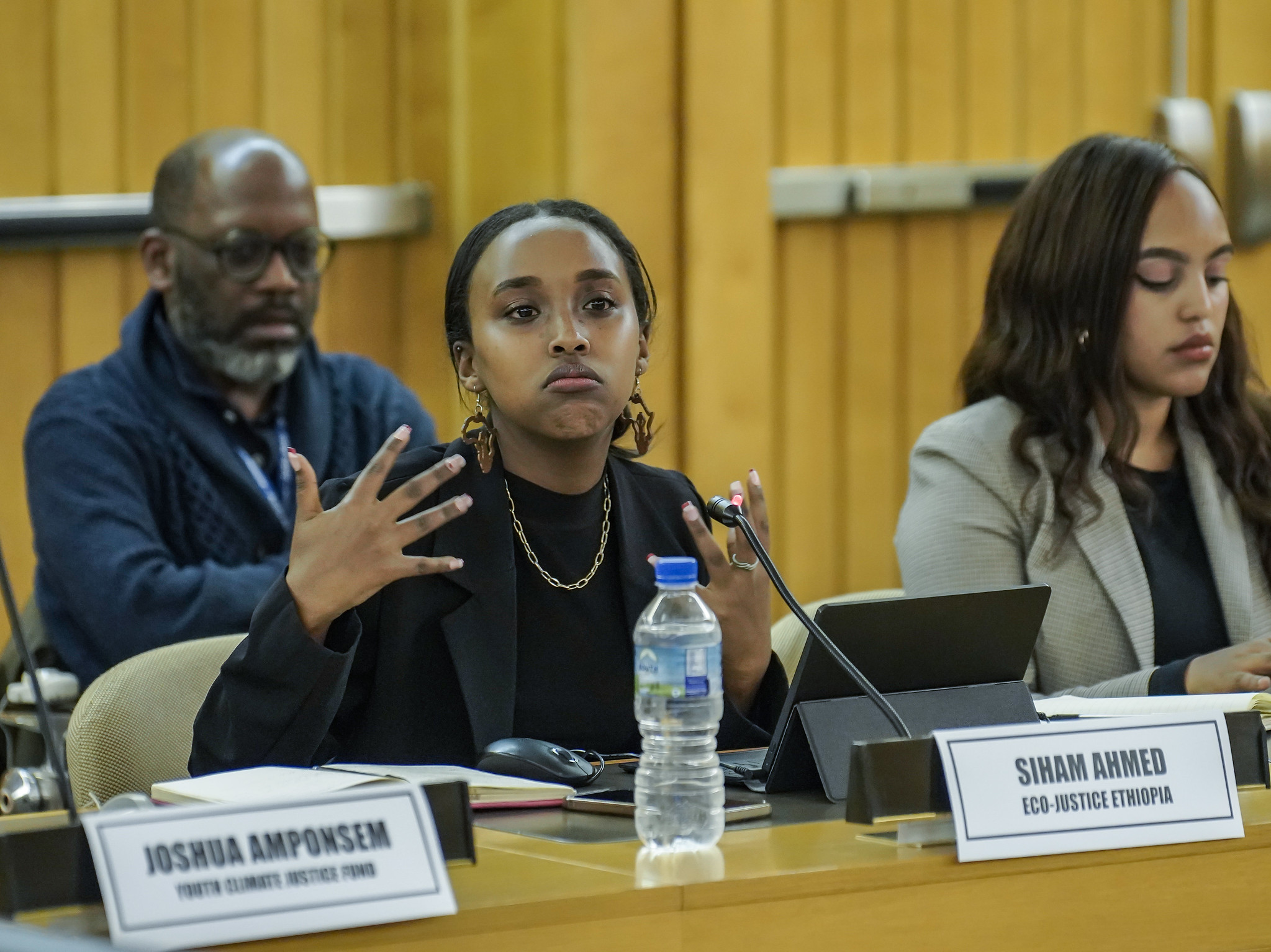“Enough talk, it’s time to act”: in Ethiopia, youth reinforce leadership against the climate crisis
African youth in Addis Ababa call for strong leadership, green jobs, and inclusive governance, positioning COP30 as a critical milestone for climate justice

By Leandro Molina / COP30 Brasil
On Saturday, September 6, young leaders from various African countries convened in Addis Ababa, Ethiopia, for the Youth Global Ethical Stocktake (GES) event. Held as a preparatory event for COP30 and part of the UN Africa Climate Week, the gathering included representatives from COP29, the United Nations Development Programme (UNDP), the United Nations Children’s Fund (UNICEF), civil society organizations, and youth networks from both Africa and Latin America. Participants engaged in a self-managed dialogue on youth involvement in the upcoming conference in Brasil.
The meeting, hosted at the UN Economic Commission for Africa, amplified the voices of young people in discussions on the ethical dimensions of the climate crisis and international agreements. This "self-managed" format allowed civil society—including students, teachers, social movements, and community organizations—to directly shape the agenda, produce key reflections, and submit contributions to the official COP30 process.
Brazilian COP30 Youth Climate Champion, Marcele Oliveira, emphasized the pivotal role of youth leadership in the GES debate. According to Ms. Oliveira, the meeting in Addis Ababa—the "Cradle of Humanity"—symbolizes the essential role of new generations in developing solutions to the climate crisis. She noted that the gathering in Ethiopia revealed both the frustration with the slowness of international negotiations and concrete paths forward. These include reforming global governance to include more youth, women, and people with disabilities, using culture and communication as tools for mobilization, creating green jobs, and strengthening climate education. Regarding financing, she added, "The solution already exists in the territories. What is missing is fair and adequate investment to expand our efforts.”

Marcele also emphasized the leadership of African youth, who, according to her, face challenges similar to those in Latin America but demonstrate great organizational and innovative capacity. “African youth are leaders in this process. We need their solutions to gain global visibility,” she stated.
Regarding expectations for COP30 in Belém, Ms. Oliveira stressed that the Conference must be a milestone for climate justice and for transitioning from discussion to implementation. “Enough talk, it’s time to act. COP30 must be remembered as a turning point where education, visibility, and climate opportunities were concretely boosted,” she concluded.
The African agenda was seen as having special symbolic weight, as it not only brought together youth from different countries but also highlighted Africa’s strong presence at a time when the continent is calling for climate justice. The debate in Addis Ababa was guided by two central questions:
1. Why do we so often deny or ignore what science and traditional knowledge say about the climate crisis, while sharing or tolerating misinformation—even knowing lives are at risk?
2. What can we do to ensure that wealthy countries—major producers and consumers of fossil fuels—accelerate their transitions and contribute funding for these measures in the most vulnerable countries?
Reflections on the current dilemmas
Climate youth leaders from various countries presented analyses of the climate crisis's dilemmas and concrete proposals for solutions, underscoring the urgency of fair and inclusive action. During the debate, they discussed why science and traditional climate knowledge are so often ignored or denied worldwide. Proposed solutions included green jobs, adaptation strategies, the integration of climate and security, and effective communication strategies to combat misinformation.
Mr. Elliot Itua Osemudiame of the African Institute of Green Economy and Sustainability noted that in contexts of conflict, violence, and migration, priorities such as education, peace, and security often take precedence over climate issues. In countries such as Sudan, Palestine, the Democratic Republic of the Congo, Ukraine, and Haiti, millions of children have been unable to attend school due to humanitarian crises, demonstrating the overlap between climate impacts and serious structural challenges.
Participants stressed that climate finance must be just, predictable, and accessible. It should focus on local solutions and resilience in vulnerable communities. The goal is to provide resources and implement and scale practices that are already effective in these areas, ensuring that solutions are effective and rooted in people’s realities.
Additionally, the youth advocated for changes in global governance that would make processes more inclusive of women, people with disabilities, youth, and traditional communities. Ms. Mesene Kessy Smeralda, a UNICEF Youth Climate Advocate from Gabon, emphasized the importance of integrating ancestral and local knowledge and of valuing the expertise of historically marginalized territories, such as favelas and rural areas. She also stressed the importance of climate education, as well as the use of culture and technology as essential mobilization tools.

African youth demand a greater voice in climate policy
Siham Ahmed, an Ethiopian activist with EcoJustice Ethiopia, argued that discussing the climate crisis without listening to young people means ignoring the majority of the continent’s population. "More than 70% of Ethiopia's population is young, and the same is true across Africa, where over half of the population is under 30. Excluding these voices from decision-making processes denies the demographic reality of our countries,” she said during the Youth Global Ethical Stocktake.
Ms. Ahmed noted that in her research on the role of children and youth in Ethiopian climate policy, many participants reported feeling as though their opinions did not matter. Even when invited to meetings, they believe their contributions do not influence decisions because government positions prevail. Another critical issue is the concentration of debates in major cities. “Centralizing debates in large urban centers reinforces the exclusion of those living outside them,” she explained.
According to Ms. Siham Ahmed, there are also language challenges beyond geographic barriers. Much of the discussion uses technical terms and English without proper translation into local languages, which limits understanding and reduces effective youth participation. She believes that adapting the language is essential to making the debate more inclusive.
EcoJustice Ethiopia has been advocating for the country’s new Nationally Determined Contributions (NDCs), which are due in September, to accurately reflect the perspectives of young people. Siham also made an appeal regarding COP30 in Belém, Brasil. She believes the conference must be a turning point where youth voices are incorporated into decision-making processes. “If more than half the population is young, a policy that does not include their voices cannot be considered representative,” she warned.
"Youth are not the future; they are the leaders of today," said Wanjira Mathai, co-leader of the Global Ethical Stocktake.
Ms. Mathai, a Kenyan environmentalist, argues that youth should be recognized as active leaders in the present, not just a promise for the future. She believes that youth engagement is crucial because the new generations will face the most severe impacts of the climate crisis. "We cannot treat them only as a social category. They are leaders now. We need them to build a legacy of justice, transparency, and real action in the face of the climate crisis,” she stated.
Ms. Mathai noted that youth presence has proven essential to giving legitimacy to the discussions throughout the regional dialogues of the GES. "They want to be heard, and they have the right to be at the center of decision-making processes. When African youth spoke here, everyone listened. It is not easy, but it is indispensable that they be incorporated into climate policies," she added.
The Global Ethical Stocktake is one of the circles created by the COP30 Brazilian Presidency to foster collaboration among global leaders from various sectors. In addition to regional dialogues, such as the one held this week in Addis Ababa, self-managed meetings are central to this strategy. Anyone—including individuals, organizations, and social movements—can organize their own debate by following the guide available on the official COP30 website in Portuguese, English, and Spanish. They can then register their results on the Brasil Participativo platform.
